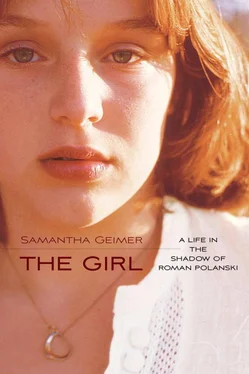But the judge said not to worry. He was going to sentence him, but well, not really. In order to make each lawyer happy and to protect his image as a tough-minded defender of justice, Judge Rittenband planned some stage direction of his own.
When we get into court, here’s what I want you to do, he told the lawyers. He told Gunson to argue that he wanted Polanski put in custody. Then, he said, he would speak from the bench before issuing the ninety-day sentence. That would be Dalton’s cue to speak, but under backstage directions from the judge, Dalton was not permitted to argue the punishment was too harsh.
Well, this was Hollywood. Judge Rittenband had cast himself as writer-director-producer-actor and was orchestrating every beat of this production, thinking only about what was best for his own image. My family was only concerned that I did not get called to testify. That’s why we agreed to— encouraged —the reduced charges, but we still wanted all parts of the agreement to be enforced. If the judge changed one part, the rest of the agreement could fall apart and I’d find myself on the stand being cross-examined by Douglas Dalton.
The public would know there had been a plea bargain, that Polanski had admitted to unlawful sexual intercourse, and that he was sentenced to Chino State Prison for ninety days for a diagnostic study with the chance, depending on the results of that study, he could be sentenced to more time. Here’s what the public would not know—that the judge had offered Dalton a deal. He would sentence Roman to ninety days, but Dalton would ask for deferrals in ninety-day increments. In a year’s time, when all had calmed, and additional favorable probation reports had come in, the judge would make the whole business go away. No one in the media or the public would be the wiser.
Larry understood that Dalton had no choice. He had to either play it the judge’s way or risk the collapse of the plea deal altogether. There was no reasoned approach with Judge Rittenband, the lawyers were now fully realizing, not with someone far more interested in the movie starring Laurence Rittenband than in the movie starring Polanski and a thirteen-year-old rape victim.
And so the lawyers walked into court, resigned to saying their lines as the judge had directed. First Gunson, then Judge Rittenband, then Dalton, then Larry. Curtain. Applause.
If nothing else, the judge’s trespasses forged some unusual alliances, between the antagonists Larry and Dalton, and between the natural adversaries Dalton and Gunson. They may have had problems with each other personally, but they bonded over their shared sense that Rittenband was certifiable.
Rittenband had asked Polanski to give an accounting of himself. It is affecting in its very coolness; he had lived through a great deal. It says in part:
Dear Judge Rittenband,
I have been asked to write you a short account of my life. Following is what I think are the chief things that have happened to me….
I was born in Paris in 1933, of Polish immigrants who had met and married in Paris. Shortly before the war, their financial situation forced our return to Poland. In September, l939, I started school in Cracow, but after one week the war began. We fled to Warsaw, hoping and believing the Germans would never advance that far. Unfortunately, the city was destroyed and the country fell.
We returned to occupied Cracow and were soon segregated with the rest of the Jewish population. I don’t think I need dwell too much on the known events of the next few years. The population of the ghetto was systematically reduced by raids….
Presently my mother was taken to Auschwitz, where she died. It wasn’t until long after the war that I learnt she was pregnant. Before one raid, I cut through the barbed wire as usual but when I sneaked back I discovered that this time it was the final liquidation of our Cracow ghetto. The last men were being marched away, including my father. I tried to speak to him, but he signaled me to run away, which I managed to do. I was eight years old at the time.
Somehow I managed to survive the next few years, moving between various friends of my family and relatives in isolated parts of the country. Occasionally I ventured into town and sold newspapers, and my chief memory here is of going to movies with the money I made from that. I felt a slight guilt at this, because the movies were German and patriotic slogans on the wall said: “Only pigs go to movies.”
The Soviet offensive of 1945 found me back in Cracow, and after the liberation I remained there, unhurt by the war except for an arm injury caused by the very last bombs dropped by the retreating Germans. An uncle found me in the street and took me in.
A few months later my father returned from Mauthausen, which he had miraculously survived. I was naturally overcome with joy, but then he remarried, and for some reason that neither of us ever fully understood and made both of us sad, we were never again as close as we had been during my earliest childhood. It seemed best that he give me an allowance and that I live from then on in a kind of boarding house.
Now I’m thirteen, back in school. I started working on the side as a child actor, and at fourteen I played the lead in a play called “Son of the Regiment.” It was a big smash, and unquestionably the acclaim I received determined my desire to follow a theatrical career. My interest in school academics lessened. I became a poor student at best, though I vigorously pursued athletics of all kinds, specially bicycle racing. Probably my small stature, of which children are terribly conscious even if they don’t say so, was a powerful motivation towards those physical activities, which indeed I have pursued to the present day.
At sixteen I was attacked by a thug trying to rob me. He beat me on the head with a stone hard enough to put me in hospital for two weeks, with another month in bed recuperation. Actually, I was luckier than I realized. The thug was arrested and found guilty of murdering three persons during assaults similar to the one on me. He was hanged.
[Eventually Polanski ended up in Poland’s National Film School, married, and in 1960 was able to make his first feature film, Knife in the Water . His wife left him, he moved to France, and he eventually spent time in London also making movies, despite barely speaking English.]
Soon after, Robert Evans of Paramount Pictures invited me to Hollywood in 1967 to make my first American movie: “Rosemary’s Baby.” It wasn’t surprising: I was already typed as a horror-movie director because of “Repulsion.” I had never specially intended to concentrate on that genre—it had simply seemed the most saleable when I was broke—but as so often seems to happen, accidental choices turn into the back-stories that color the rest of our lives.
I married Sharon in 1968 in London, though we’d already decided to live in California. “Rosemary’s Baby” was an enormous hit. Everything seemed to be working out.
Then came the events of 1969 which made everything that I achieved seem senseless and futile. California became unbearable after that. I returned to London to live and work. Though I threw myself into professional activity with all my energy, my next two pictures, “Macbeth” and “What?” turned out to be failures. In 1973, Robert Evans invited me once more to Hollywood, this time to make the film “Chinatown.”
I was filled with apprehension about coming back to California, but the plain truth is that I needed the money—also, a successful picture, if I were to survive in my profession. Once I started work, everything went well. “Chinatown” was released in 1974 and received eleven nominations for the Academy Awards….
[But a] strange tainted reputation seemed to accompany me, based partly on the subject matter of my films but even more so on the enormous publicity given Sharon’s murder. I was welcomed everywhere as a “jet-setter” and given unending parties. I found it harder and harder to establish meaningful relationships with women….
Читать дальше












